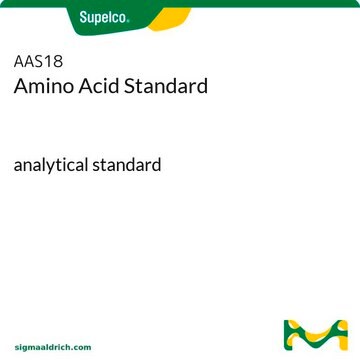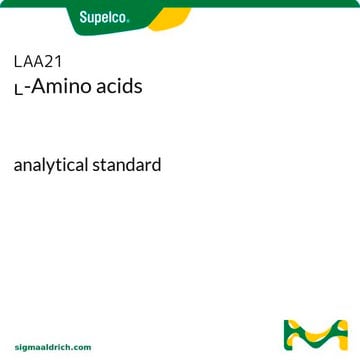E5139
DL-Ethionine
≥95% (TLC)
Synonym(s):
DL-2-Amino-4-(ethylthio)butyric acid
About This Item
Recommended Products
product name
DL-Ethionine, ≥95% (TLC)
Quality Level
Assay
≥95% (TLC)
form
powder
color
white to off-white
mp
269 °C
application(s)
cell analysis
storage temp.
−20°C
SMILES string
CCSCCC(N)C(O)=O
InChI
1S/C6H13NO2S/c1-2-10-4-3-5(7)6(8)9/h5H,2-4,7H2,1H3,(H,8,9)
InChI key
GGLZPLKKBSSKCX-UHFFFAOYSA-N
Looking for similar products? Visit Product Comparison Guide
Application
- Superoxide dismutase activity as a measure of hepatic oxidative stress in cattle following ethionine administration.: This study evaluates the hepatic oxidative stress in cattle induced by ethionine administration by measuring superoxide dismutase activity. The findings suggest a significant oxidative response, highlighting the role of DL-Ethionine in studying liver oxidative mechanisms (Abd Ellah et al., 2009).
Biochem/physiol Actions
Signal Word
Warning
Hazard Statements
Precautionary Statements
Hazard Classifications
Eye Irrit. 2 - Skin Irrit. 2 - STOT SE 3
Target Organs
Respiratory system
Storage Class Code
11 - Combustible Solids
WGK
WGK 3
Personal Protective Equipment
Certificates of Analysis (COA)
Search for Certificates of Analysis (COA) by entering the products Lot/Batch Number. Lot and Batch Numbers can be found on a product’s label following the words ‘Lot’ or ‘Batch’.
Already Own This Product?
Find documentation for the products that you have recently purchased in the Document Library.
Our team of scientists has experience in all areas of research including Life Science, Material Science, Chemical Synthesis, Chromatography, Analytical and many others.
Contact Technical Service








